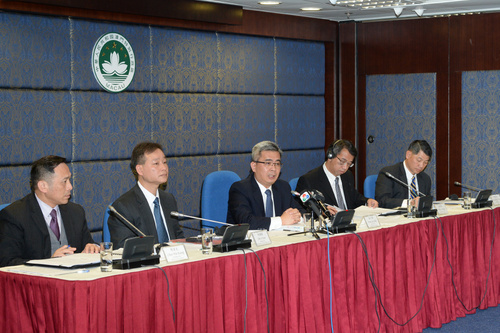 Secretary for Security, Mr Wong Sio Chak, releases the crime figures of 2015.
Secretary for Security, Mr Wong Sio Chak, releases the crime figures of 2015.
The number of crimes reported to police in 2015 fell by 2.6 percent year-on-year, and there were no cases of the most serious forms of violent crime reported last year, said today the Secretary for Security, Mr Wong Sio Chak. The Secretary made the comments at a press briefing this morning, when he disclosed the figures for crime cases recorded last year. Mr Wong said the police conducted a total of 13,653 criminal investigations last year, a decline of 363 cases compared to 2014. A total of 5,476 people were transferred to the Public Prosecutions Office for further investigation in 2015, an increase of 680 people from the prior year. The Secretary said the authorities would continue the efforts to maintain public order and use effective crime-fighting measures to ensure the stability of Macao. A total of 1,553 gaming-related cases were recorded in 2015, an increase of 38 percent from 1,125 cases in 2014. The cases reported last year were mostly related to false imprisonment and usury, said Mr Wong. The Government remains on alert for any possible negative impact on security brought by the ongoing adjustment in Macao’s gaming industry, said the Secretary. Intelligence gathered so far showed no unusual activity, he added. Mr Wong additionally said the authorities would constantly keep assessing the situation and would step up enforcement efforts in order to reduce the number of gaming-related crimes in Macao. There were 7,584 cases of crime against property last year, representing a 3.3 percent decline from 2014. A total of 2,721 crimes against persons were reported in 2015, a slight increase of 0.1 percent from the previous year. The number of violent crimes reported last year showed a 24-percent increase compared to 2014, to 755 cases. The increase was mainly due to more cases of false imprisonment: a total of 410 such cases were reported in 2015, an 86.4 percent rise from 220 cases in 2014. The most serious forms of violent crime – such as murder, kidnap and grievous assault – were either at low levels or non-existent in 2015. Cases of telephone fraud fell by 42.9 percent to 161 from 282 cases reported in 2014. The decrease in the number of telephone fraud cases was partly due to the police’s anti-crime promotional campaigns, Mr Wong said. The police would pay special attention to the most recent trends in crime and launch more promotional campaigns to raise awareness among larger sectors of the community, he added. Crimes against society saw a decrease of 9.3 percent year-on-year, to 813 cases. Crimes such as using forged documents went up by 8.7 percent year-on-year in 2015, but there was a 44.7-percent decline in cases related to transferring counterfeit money. A total of 25 cases of arson were reported to the authorities last year. Cases of juvenile delinquency fell by 27.7 percent year-on-year to 47 in 2015, involving 78 youngsters. There were a total of 30,506 illegal immigrants and over-stayers detected last year, representing a significant decline of 38.6 percent from 2014. Of these incidents, 25,053 involved mainland residents and 3,140 involved people from overseas that overstayed their visas. In 2015, there were a total of 5,079 infractions relating to taxi services. The cases included 1,874 incidents of refusing to take passengers; 1,233 cases of overcharging; and 357 cases of unlicensed transportation services. Mr Wong said the police would beef up efforts to implement the Government’s policy strategy for the security area in 2016 – “proactive policing”, “community policing” and “proximity policing” – in a bid to strengthen promotion and communication with the public.


